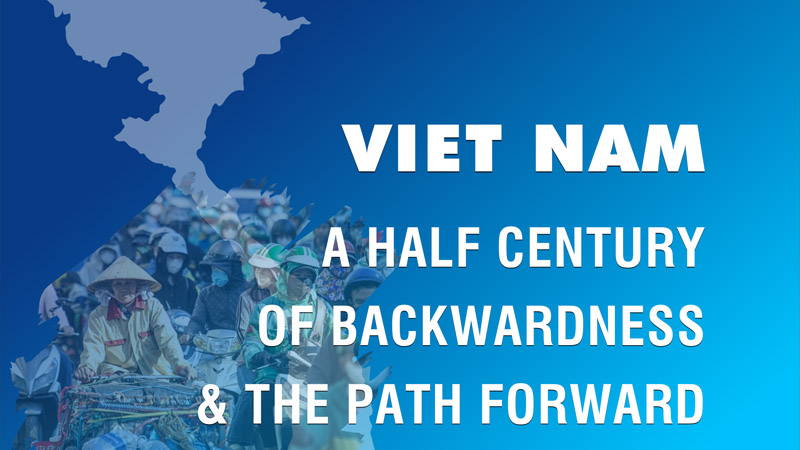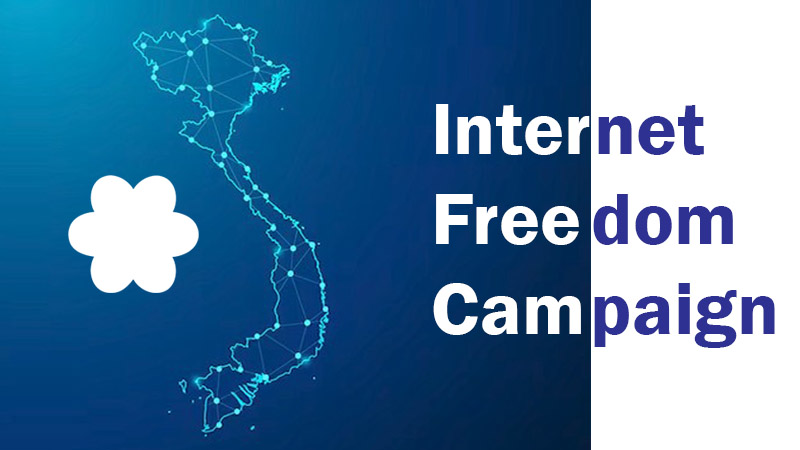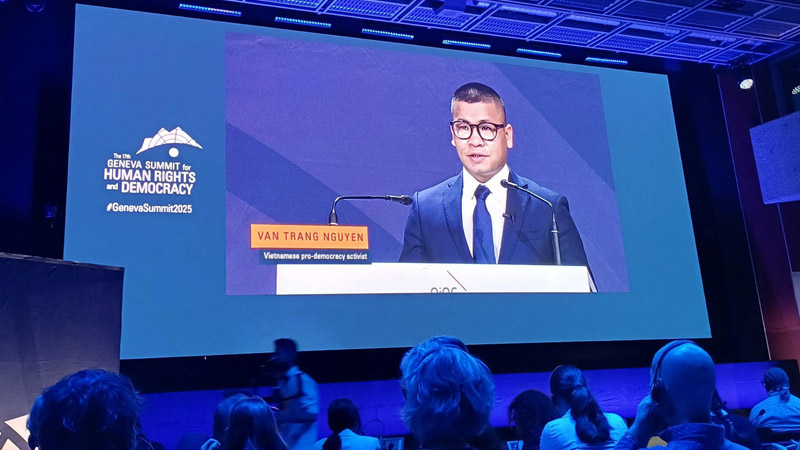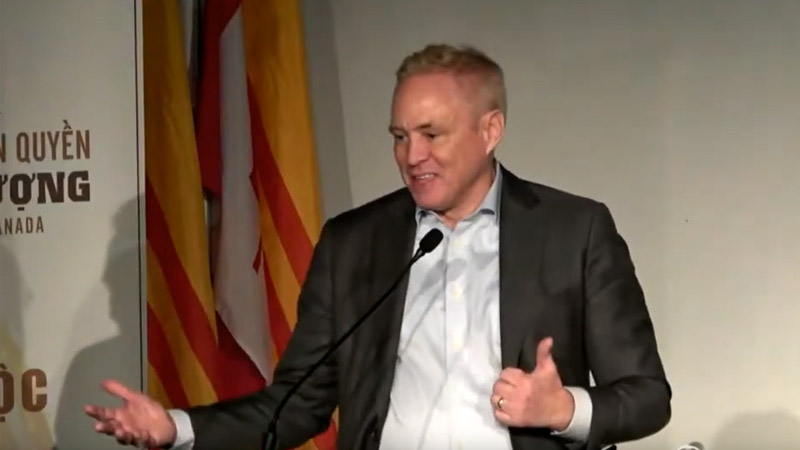Interview with Mrs. Janta Khantinat, wife of Mr. Somsak Khunmi, a democracy activist detained by the government of Vietnam since November 17, 2007 in Saigon.
Intro: As we reported earlier, on November 17, 2007 Vietnamese police arrested 6 people at a house at Ton That Hiep street in Saigon. These six people were preparing documents on non-violent struggle for distribution. In a press release dated November 19, 2007, Viet Tan (Vietnam Reform Party) acknowledged that these six people are members and supporters of Viet Tan. Viet Tan has demanded the government of Vietnam release the arrested since they just exercised their freedom of expression.
Of the six arrested, two are American nationals, one is a French national, two are Vietnamese nationals and one is a Thai national. Three days later, police arrested another Vietnamese national. Vietnamese authorities accused these people of being “terrorists”; however under international pressure the authorities released four individuals but are still holding three until now without charge. The three that are still under detention are Dr. Nguyen Quoc Quan, Mr. Somsak Khunmi (aka Nguyen Quoc Hai) and Mr. Nguyen The Vu.
To help shed the light on the situation of Mr. Somsak Khunmi, a name that is not familiar with the Vietnamese community, Vietnam News Network (VNN) contacted the wife of Mr. Khunmi to have this special interview.
VNN: We are from VNN (Vietnam News Network) a news agency serving the Vietnamese community abroad. Thank you for having this special interview with us in order to help the Vietnamese community to know more about Mr. Somsak Khunmi and the details surrounding his arrest. First, could you tell us a little bit about yourself?
Janta Khantina (JK): We would like to thank you so much for your concern for our difficult situation. My name is Janta Khantinat, a Thai citizen and wife of Mr. Somsak Khunmi. We married 20 years ago and have four children, three girls and a boy.
VNN: How did the two of you meet?
JK: Near the end of 1987; I met Somsak for the first time at my uncle’s house [my uncle is the Village Chief] in Trakarn, Ubon. I felt attracted to him right away because he is resolute, discrete, and gentle. He told me he is a foreigner doing charity work near my village. I found him interesting because he could speak Thai with some Laotian. The second time we met, we talked more with each other and I knew him as a Japanese. Falling in love with him, we lived together since the beginning of 1988. We had a simple wedding ceremony but there was no marriage license because at that time he lived in Thailand illegally.
VNN: Have you ever asked Mr. Khunmi why he does not have proper paperwork to live in Thailand and when did you find out that Mr. Khunmi is not of Japanese origin?
JK: After the marriage, I questioned him many times but he only asked for my understanding and he would explain this issue in the future. Because I love and trust him, I accepted it.
My children, me and the people in our village always thought that Somsak was a Japanese until he was detained in Vietnam at the end of November 2007. When that news was published by the local newspapers, I realized that my husband is a Vietnamese. My family is shocked because of two new facts: My husband is Vietnamese and not Japanese, and he is in jail in Vietnam.
VNN: Could you share with us your 20 years living together? With Mr. Khunmi’s illegal immigrant status what kind of difficulties did you encounter?

JK: Due to his illegal immigration status, paperwork problem with local police began early when I was pregnant with the first child in 1988 so he moved around a lot sometimes to Song Kla or Bangkok, partly to avoid difficulty for me and the unborn kid, partly for his work. He stopped by to visit me for a few days before moving on. We carried on like that until our baby girl Ploy was born in 1989.
When I was pregnant with the second girl named Mook, Somsak was jailed for his illegal immigrant status in the Immigration Detention Center, Soi Suan Plu street, Bangkok. When Mook was born, I found out Somsak was not in Thailand anymore. Somehow he landed in Kathmandu, Nepal. With his illegal status, I cannot file the birth certificate for my baby girl under her father’s name so I have to use my family name instead. Later I found out that the reason he is in Nepal is due to his friends, Robert and Toyama, helped him to fly to Singapore then come back to Thailand by land. However Singapore authorities expelled him to Nepal. There, he was under protection of UNHCR (United Nation High Commission for Refugees). Later, Robert and Toyama helped Somsak to leave Nepal for Malaysia, then he returned to Thailand as a Nepal citizen in 1991. However from 1991-1993 our family was still not together because he worked far from home and he didn’t want to cause trouble for our family.
Facing these difficulties and uncertainties of an illegal immigrant life, I discussed with Somsak why not come back to Japan to finalize the paperwork then return to Thailand. His only explanation was that he did not want to stay away from me and the kids, and I will understand the story at the right moment. Finally, he got help to obtain Thai paperwork under the name Somsak Khunmi. We left Trakarn at the end of 1993 and moved near to Ubon to live together. This is the first time we truly had a happy family life together after five years of sorrow and ups and downs.
VNN: Facing those difficulties, what are your thoughts on Mr. Khunmi’s activities?
JK: Although I did not know of Somsak’s activities, I strongly believe that my husband is a good person and he did not do anything wrong. The first time my husband was in jail in Bangkok and deported to Nepal later, I was young so I could overcome all difficulties. That was 20 years ago. With my husband in jail in Vietnam now, although my children are older, I am very tired and cannot sleep. I need to see the doctor for sleeping medication.
VNN: When did you find out your husband’s true identity and details of his activities?
JK: After my husband was jailed in Vietnam, his friend came to visit my family and explained my husband’s identity and his activities. Through this visit, I knew my husband’s Vietnamese name is Nguyen Quoc Hai and he left Japan for Thailand to join a political movement led by Admiral Hoang Co Minh. After the Admiral died while returning to Vietnam, Somsak left the organization and that was the time we met each other.
VNN: Since your family reunited in 1993, how did your husband support the family financially?
JK: To support the family, besides farm work, my husband tried to make additional money by some tailor work, or by driving people in the village to town, or occasionally helping me with selling food at night for people in the village. From the end of 1993, I saw him focus on a special job at night. That is listening to foreign-language broadcasts and writing down what he heard. I didn’t know what that broadcasted language was. When I asked him, he just smiled and answered that he is listening to a Japanese station and wherever he is, he needs to know what happens in the world so that knowledge would help him to help others. In the same year when he returned after a work trip, he looked very tired, down and saddened. When I asked him what happened, he let me know that there was a person that he deeply respected. He called him the “Master” and he is the person who guided my husband to follow a meaningful path. My husband thought that the “Master” had passed away pursuing that meaningful path. Later I knew the Master is Admiral Hoang Co Minh.
VNN: You portrayed Mr. Khunmi as an idealist doing good things for his country. What about his family life? Is he a family man? How does he treat his children? His neighbors?
JK: In our family, Somsak is a model husband. He never hit the kids. He raised them to be good people in the way they talk, their manner. He tought them to have self-respect, to help others. He took care when our kids fell ill. Coming back from his trips, he brought back gifts for our children. Our kids are happy and proud with their friends that they have a loving father.
People in our village like him because he is a nice, flexible person avoiding unnecessary arguments. He is willingly to help others when needed. We are not well-off, on the contrary we are in a tight financial situation, yet if our neighbor needs help he is always willing to help. When he came back from trips, he would bring back some gift like a bottle of liquor or some cigarettes for the neighbors. People liked him for that.
He lives and thinks like a Thai, always respects and admires Thai Royalty for bringing stability and prosperity for the Thai people during last six decades. He also paid attention to Thai politics. When parliamentary election is coming, he is very happy and gets involved in campaigning for the political party that he supports.
In terms of his character and works which make the villagers love him, I can give one example: There are 160 heads of families in our village. When the villagers discovered my husband is a Vietnamese and in jail in Vietnam, there were over 60 family heads who signed the petition to request the Vietnamese government to release my husband for humanitarian reasons.
VNN: In November 2007 when you heard about your husband’s arrest, how did that affect your family life, you and your children particularly?
JK: When the news of his arrest published on Thai newspaper hit us, it was shocking for our family. Our two eldest girls are in their teens now; they are more thoughtful and worry more than their siblings. They cried silently at night to spare me more suffering. The two younger children lost their appetite and showed no interest in schooling. I tried hard to calm my children to continue on their normal lives so my husband wouldn’t be disappointed in them when he sees them again. However there is so much a person can withstand. Over twenty years ago when I was young, I could overcome the hardship, but nowadays I have to visit doctors to get sleeping pills so I can sleep.

VNN: In your difficult situation, have friends or colleagues of your husband, people from Radio New Horizon offered any help for your family?
JK: In the past, my husband’s friends occasionally stopped by for a visit. We either hosted them or they invited us for dinner in Ubon. I remembered them as Robert, Toyama, Jim. My husband was very happy to see them, engaging in lively discussion. He told me that if anything happened to him, his friends would help our family.
Indeed, when Somsak was arrested in Vietnam, Robert and Toyama visited us to support our spirits and provide material help. Particularly Mr. Robert stayed with us for two days. This time he explained to me and my children who my husband really is and what he did in the years past. My husband is a Vietnamese. He wishes Vietnam to have a democratic system and its people happy like Thailand, his second home after Vietnam.
My husband is involved with Radio New Horizon. His main responsibility is to report important news in the region as well as help to arrange interview with dissidents. He is dedicated to his job overcoming hardship and difficulty to accomplish good things for others, like what he taught his children to believe in. Now I and our children understand why my husband and their father accept the hardship of living illegally in Thailand in order to take care of our family and at the same time to pursue his righteous cause. He could have chosen to stay in Japan to have a good life just like many other Vietnamese refugees but he chose differently. One thing that I could not imagine is my husband hiding his true identity and his pro-democracy activities from our family during the past 20 years. My guess is that he did not want us to worry while we could not help him with what we knew.
Ms. Thanh Thao, the reporter from Radio New Horizon who went to Vietnam with my husband in November 2007 and was arrested at the same time, stopped by in Bangkok to see me. Although the language barrier prevented us from sharing more, our tears said it all. One thing I remember the most and brings me hope is what Ms. Thanh Thao said via the interpreter: She felt anguish that while on the same mission and being arrested together, she is now free while Somsak is still in jail. She promised to do all she can to gain his freedom. I also hope and appeal to the Thai government to help my husband to be free for humanitarian reason.
VNN: This is a question we wanted to ask you before the start of this interview. Based on your experience, this question might be irrelevant but our readers might still want to know. You can decline to answer if you don’t want to. The question is the Vietnamese state media as well as Thai media report that your husband belongs to a “terrorist” organization. Do you believe that?
JK: We live in the countryside. We did not know my husband’s activities until recently and we don’t know the world situation concerning terrorism. Our family life is so peaceful in the Northeast of Thailand. There is no violence in my village so it’s difficult for me to answer that question. But I strongly believe that my husband is not a violent person as the Vietnamese media has defamed him. Especially considering what Mr. Robert has been telling me that many human rights groups, elected officials from America, France, Australia, etc. spoke up for my husband and his friends arrested in November 2007. If my husband is such a bad person why would he get support from those elected officials?
VNN: Could you share with us your feelings, impressions as well as that of your children when you found out the true identity and activities of your husband fighting for freedom and democracy for Vietnam?
JK: Although we understand my husband’s dream and his activities, this issue is too big for me to fully comprehend. But definitely my children and I will love and respect him more because he had accepted the hardship with the illicit life in Thailand for staying close to his family and at the same time taking risks to fulfill his dream since he left Japan for Thailand in 1981.
VNN: On behalf of VNN news agency, we sincerely thank Mrs. Janta Khantinat, the wife of Mr. Somsak Khunmi aka Nguyen Quoc Hai for the opportunity to have this special interview. Your last words for our readers?
JK: I would like to thank you for giving us a chance to share with your readers our lives, the feelings for my husband, our children’s father, who we see in a new light although we have known him for almost 20 years. Taking this opportunity, please send our gratitude to Radio New Horizon, all friends, acquaintances, some we know, some we don’t know, who have supported our family during this difficult time. We wish to continue to receive such support until my husband is freed and reunited with us.
Once again, our deepest gratitude to all our benefactors.





